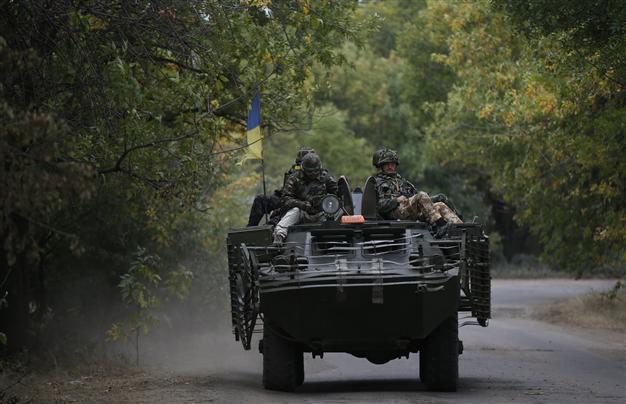Russia 'moves troops in Crimea' ahead of Ukraine-US meet
KYIV - Agence France-Presse

Ukrainian servicemen ride on an armoured vehicle near Kramatorsk, September 16, 2014. Kyiv accused Moscow of massing its troops in annexed Crimea on the Ukraine border. REUTERS Photo
Kyiv accused Moscow on Sept. 18 of massing its troops in annexed Crimea on the Ukraine border, rattling nerves just as President Petro Poroshenko prepared to meet US counterpart Barack Obama.
The apparent push north by about 4,000 troops in the Black Sea peninsula came despite Russia's declared backing of a peace overture by Kiev to try to end five months of conflict in the rebellious east.
"According to our information, almost all military units of the Russian Federation stationed in the north of occupied Crimea... were pushed to the administrative border with Ukraine along with all their equipment and ammunition," National Security and Defence Council spokesman Andriy Lysenko told reporters.
Poroshenko holds his first White House talks with Obama later Thursday, seeking to gain security guarantees from Washington as he steers the former Soviet state on a clear westwards path.
The meeting comes just two days after parliament in Kyiv ratified a historic pact with the EU and adopted legislation offering self-rule to the east in votes crucial to the future shape of the nation.
Poroshenko's offer won Russia's support, although the pro-Moscow rebels have been more dismissive, saying it will not stop their fight for full independence.
The self-rule law and accompanying legislation granting amnesty to fighters were drawn up under a truce signed 13 days ago that has eased -- but not halted -- deadly violence around insurgent strongholds in eastern Ukraine.
The situation around the flashpoint city of Donetsk appeared to be calm Thursday after days of shelling that has left around 30 civilians and soldiers dead.
Moscow, echoing comments by Washington and Brussels, said Kiev's overture was a "step in the right direction" towards ending a conflict that has cost almost 2,900 lives and sent East-West tensions spiralling to post-Cold War highs.
The law was approved just moments before MPs also ratified a landmark political and economic pact with the EU that decisively pulls Ukraine away from Moscow's sphere of influence.
Poroshenko will cast Russia as a global menace when he meets Obama, in the hope of winning a "special status" guaranteeing his troubled nation's security and support for future membership of NATO.
While Obama does not want to be drawn into a military standoff with a nuclear-armed rival, Washington has joined the EU in imposing waves of punishing sanctions on Russia.
A report by the European Bank for Reconstruction and Development (EBRD) showed how sanctions were biting, forecasting Russia's economy will shrink 0.2 percent next year.
Russian President Vladimir Putin charged Thursday that the measures violated the principles of the World Trade Organisation.
But the crisis is even more severe for Ukraine, with the EBRD projecting a massive nine percent contraction this year. The country is already relying on a huge IMF aid package to stay afloat. Analysts say Ukraine's peace overture to the east is a high-stakes gamble that could definitively splinter the country by creating a Russian-speaking zone that would depend more on Moscow than
Kyiv.
Nationalist leaders have already accused Poroshenko of capitulating in the face of Russian "aggression" that suddenly turned the tide against Ukrainian forces last month.
The head of the OSCE security group that brokered the September 5 ceasefire said there had been "encouraging" signs, highlighting the self-rule law and a number of prisoner swaps.
"These were major steps that could pave the way towards a lasting solution of the crisis," OSCE chairman and Swiss President Didier Burkhalter said in a statement.
Russian Foreign Minister Sergei Lavrov also said Wednesday: "The ceasefire is holding".
However Ukrainian Prime Minister Arseniy Yatsenyuk -- who has accused Putin of seeking to eliminate Ukraine -- declared that the armed forces would remain on "full combat readiness".
Many residents of the war-battered region remain deeply pessimistic that any political deals will halt the bloodletting.
"I was born in 1941, a child of war, and now I will die during war. What's it all for?" said 73-year-old Tatiana Semenchenko after a rocket smashed into a building in a working class district of Donetsk on Wednesday.
The new legislation gives three years of limited self-rule to the regions of Donetsk and Lugansk, known collectively as Donbass, and calls for local polls in December.
It also allows Russian to be used in state institutions and for the regions to establish closer ties with local authorities across the border -- two clauses that won Moscow's particular approval.
Both the United States and Europe hailed the legislation as a sign of Kyiv's commitment to peace but demanded that Moscow and the insurgents live up to their side of the bargain.
"This was the probably the best of a bad lot of options," said Oleksiy Garan, politics professor at the state-run Kyiv Mogyla Academy university.
"But I don't rule out that Russia could hijack the plan (by effectively swallowing up the east)."
